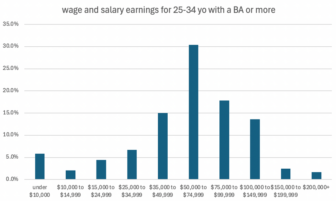In a previous post on why retaining and attracting young professional was an economic development priority I wrote:
The reason they are important to economic growth is both they are the most mobile and that knowledge workers––professionals and managers––are now, and will increasingly be, the core of the middle class. They will play the same role in the economy as high wage factory workers did for most of the 20th Century when they were the core of the middle class.
Their purchasing power will create demand for housing, retail, hospitality, etc. which will increase jobs in all those sectors. Not just in the neighborhoods where they live and work, but throughout the region and even the state when they vacation and purchase second homes. For most of the 20th Century Michigan policy was focused on meeting the interests of those high paid factory workers. Everyone understood they were the anchor of the stateʼs economy. No one argued that focusing on them was either trickle down or elitist.
Now we have data on how much college graduates add to local economies. The data comes from Jonathan Rothwell of Brookings. He calculates “the average bachelor’s degree holder contributes $278,000 more to local economies than the average high school graduate through direct spending over the course of his or her lifetime; an associate degree holder contributes $81,000 more than a high school graduate.”
Specifically Rothwell calculates that households where the highest educated member has a masters degree or more spent in 2014 $41,000 in the local economy and paid almost $8,000 in state and local taxes, compared to $32,000 and $5,000 for households with someone with a bachelors degree; $25,000 and $3,000 associates degree; $22,000 and $2,000 some college and $19,000 and $2,000 high school degree.
In that previous post I cited a New Times column by Harvard economist Edward Glaeser. I wrote: “Where talent concentrates you get more job creation. In a New York Times column entitled “Teach Your Neighbors Well”, Edward Glaser writes that the unemployment rate for all was lower in metropolitan areas with the highest proportion of adults with a four year degree or more. So the more college educated the region the lower the unemployment rate is for those without a college degree.
Rothwell’s findings are consistent with Glaeser’s. More local spending leads to more jobs for all including those without four year degrees.






